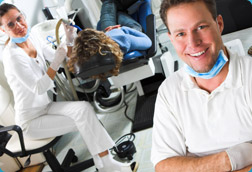Paediatric Dentistry
One of the key themes of modern dentistry is the concept of tailoring care to meet the needs of individuals. There are a wide variety of people for whom dental treatment can be a traumatic experience. These include vulnerable people, such as those with learning difficulties; they include people with phobias relating to dentistry, such as a phobia of needles, of the dental drill, or of being anaesthetised. They also include children, as your experiences of visiting the dentist as a child can very much shape how you respond to treatment and look after your teeth later in your adult life.
This is one of the reasons why providing dental treatment for children has become acknowledged as a specialist discipline. It is also very rewarding work. Many dentists choose to specialise in treating children as they know that they could make a positive impact on a patient with benefits that last a lifetime.
What does the job involve?
Paediatric dentistry is focused around the subject of oral health in children, spanning the period from birth to the age of 16 years old. Paediatric dentistry is usually a broad subject that involves more than simply treatment. It also covers research into the key issues and educational work to demonstrate to children how they can better look after their teeth.
One of the areas where paediatric dentistry differs from adult dentistry is that there is much more emphasis on education, awareness and preventative techniques. The aim of adult dentistry is usually to treat a problem. The aim of paediatric dentistry is to ensure that the child gets into good oral health habits, looking after their teeth and therefore preventing serious dental issues from arising in adult life.
Some dentists within paediatric dentistry go on to specialise in treating children with other issues, such as emotional, intellectual or physical problems. Many of these children are referred to a paediatric specialist by family dentists who struggle to cope.
What qualifications do you need?
There are opportunities for Paediatric Dentists to work in a number of clinical settings. For example, many are based in hospitals, while others run their own specialist, independent practices. To become a paediatric dentist, you must be registered on the Paediatric Dentistry Specialist Register which is held by the General Dental Council. To register, you must have at least three years of specialised training, with a specialist professional qualification.
What are the career prospects?
As mentioned above, many paediatric dentists continue their careers by developing more specialised technical skills and focusing on a particular area, such as children with particular problems. Others move into research and teaching, into roles that are focused on advancing the profession and improving the way the dental profession works with children.
Others become Consultants. To become a Consultant requires an extra two years of specialist training. It is a broader role which involves more team leadership and business management, as well as dental treatment work.
Featured Jobs
-
Example Job
- Salary:
- £24,000
- Location:
- Preston, Lancashire
Lorem ipsum dolor sit amet, consectetuer adipiscing elit. Nam nisl ipsum, interdum id, fermentum ut, convallis sed, tellus.
More Info -
Example Job
- Salary:
- £24,000
- Location:
- Preston, Lancashire
Lorem ipsum dolor sit amet, consectetuer adipiscing elit. Nam nisl ipsum, interdum id, fermentum ut, convallis sed, tellus.
More Info -
Example Job
- Salary:
- £24,000
- Location:
- Preston, Lancashire
Lorem ipsum dolor sit amet, consectetuer adipiscing elit. Nam nisl ipsum, interdum id, fermentum ut, convallis sed, tellus.
More Info
